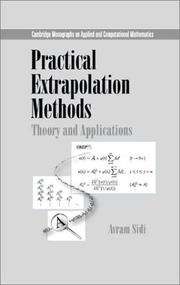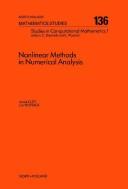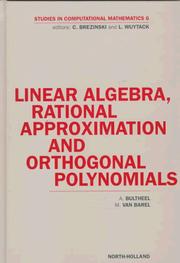| Listing 1 - 3 of 3 |
Sort by
|

ISBN: 1107128420 128041765X 9786610417650 0511204744 051106649X 0511180586 0511307578 0511546815 051106862X 9780511066498 9780511546815 9780511068621 0521661595 9780521661591 9780511060182 0511060181 9781107128422 6610417652 9780511204746 9780511180583 9780511307577 Year: 2003 Publisher: Cambridge ; New York : Cambridge University Press,
Abstract | Keywords | Export | Availability | Bookmark
 Loading...
Loading...Choose an application
- Reference Manager
- EndNote
- RefWorks (Direct export to RefWorks)
An important problem that arises in many scientific and engineering applications is that of approximating limits of infinite sequences which in most instances converge very slowly. Thus, to approximate limits with reasonable accuracy, it is necessary to compute a large number of terms, and this is in general costly. These limits can be approximated economically and with high accuracy by applying suitable extrapolation (or convergence acceleration) methods to a small number of terms. This state-of-the art reference for mathematicians, scientists and engineers is concerned with the coherent treatment, including derivation, analysis, and applications, of the most useful scalar extrapolation methods. The methods discussed are geared toward common problems in scientific and engineering disciplines. It differs from existing books by concentrateing on the most powerful nonlinear methods, presenting in-depth treatments of them, and showing which methods are most effective for different classes of practical nontrivial problems.
Causality. --- Causation. --- Extrapolation. --- Population Characteristics. --- Research Design. --- Extrapolation --- 519.6 --- 681.3*G11 --- 681.3*G11 Interpolation: difference formulas; extrapolation; smoothing; spline and piecewise polynomial interpolation (Numerical analysis) --- Interpolation: difference formulas; extrapolation; smoothing; spline and piecewise polynomial interpolation (Numerical analysis) --- 519.6 Computational mathematics. Numerical analysis. Computer programming --- Computational mathematics. Numerical analysis. Computer programming --- Approximation theory --- Numerical analysis

ISBN: 0444701893 9786611756284 1281756288 0080872476 9780444701893 9780080872476 9781281756282 Year: 1987 Volume: 136 1 Publisher: Amsterdam ; New York : New York, N.Y., U.S.A. : North-Holland ; Sole distributors for the U.S.A. and Canada, Elsevier Science Pub. Co.,
Abstract | Keywords | Export | Availability | Bookmark
 Loading...
Loading...Choose an application
- Reference Manager
- EndNote
- RefWorks (Direct export to RefWorks)
While most textbooks on Numerical Analysis discuss linear techniques for the solution of various numerical problems, this book introduces and illustrates nonlinear methods. It presents several nonlinear techniques resulting mainly from the use of Padé approximants and rational interpolants.
Analyse numérique --- Numerical analysis --- Numerieke analyse --- 517.518.8 --- 519.6 --- 681.3*G11 --- 681.3*G12 --- Mathematical analysis --- Approximation of functions by polynomials and their generalizations --- Computational mathematics. Numerical analysis. Computer programming --- Interpolation: difference formulas; extrapolation; smoothing; spline and piecewise polynomial interpolation (Numerical analysis) --- Approximation: chebyshev; elementary function; least squares; linear approximation; minimax approximation and algorithms; nonlinear and rational approximation; spline and piecewise polynomial approximation (Numerical analysis) --- 681.3*G12 Approximation: chebyshev; elementary function; least squares; linear approximation; minimax approximation and algorithms; nonlinear and rational approximation; spline and piecewise polynomial approximation (Numerical analysis) --- 681.3*G11 Interpolation: difference formulas; extrapolation; smoothing; spline and piecewise polynomial interpolation (Numerical analysis) --- 519.6 Computational mathematics. Numerical analysis. Computer programming --- 517.518.8 Approximation of functions by polynomials and their generalizations --- Analyse numérique --- ELSEVIER-B EPUB-LIV-FT --- Mathematical analysis. --- Numerical analysis. --- 517.1 Mathematical analysis --- Analyse numérique. --- Series (mathematique) --- Equations non lineaires --- Sommation --- Approximation des solutions

ISBN: 0444828729 9780444828729 9780080535524 0080535526 1281047600 9786611047603 Year: 1997 Volume: 6 Publisher: Amsterdam ; New York : Elsevier,
Abstract | Keywords | Export | Availability | Bookmark
 Loading...
Loading...Choose an application
- Reference Manager
- EndNote
- RefWorks (Direct export to RefWorks)
Evolving from an elementary discussion, this book develops the Euclidean algorithm to a very powerful tool to deal with general continued fractions, non-normal Padé tables, look-ahead algorithms for Hankel and Toeplitz matrices, and for Krylov subspace methods. It introduces the basics of fast algorithms for structured problems and shows how they deal with singular situations. Links are made with more applied subjects such as linear system theory and signal processing, and with more advanced topics and recent results such as general bi-orthogonal polynomials, minimal Padé approximation, poly
Ordered algebraic structures --- Numerical approximation theory --- Computer science --- lineaire algebra --- Algebras, Linear --- Euclidean algorithm --- Orthogonal polynomials --- Padé approximant --- #TELE:SISTA --- 519.6 --- 681.3*G11 --- 681.3*G12 --- 681.3*G13 --- Algorithm of Euclid --- Continued division --- Division, Continued --- Euclid algorithm --- Euclidian algorithm --- Euclid's algorithm --- Algorithms --- Number theory --- Linear algebra --- Algebra, Universal --- Generalized spaces --- Mathematical analysis --- Calculus of operations --- Line geometry --- Topology --- 681.3*G13 Numerical linear algebra: conditioning; determinants; Eigenvalues; error analysis; linear systems; matrix inversion; pseudoinverses; sparse and very largesystems --- Numerical linear algebra: conditioning; determinants; Eigenvalues; error analysis; linear systems; matrix inversion; pseudoinverses; sparse and very largesystems --- 681.3*G12 Approximation: chebyshev; elementary function; least squares; linear approximation; minimax approximation and algorithms; nonlinear and rational approximation; spline and piecewise polynomial approximation (Numerical analysis) --- Approximation: chebyshev; elementary function; least squares; linear approximation; minimax approximation and algorithms; nonlinear and rational approximation; spline and piecewise polynomial approximation (Numerical analysis) --- 681.3*G11 Interpolation: difference formulas; extrapolation; smoothing; spline and piecewise polynomial interpolation (Numerical analysis) --- Interpolation: difference formulas; extrapolation; smoothing; spline and piecewise polynomial interpolation (Numerical analysis) --- 519.6 Computational mathematics. Numerical analysis. Computer programming --- Computational mathematics. Numerical analysis. Computer programming --- Fourier analysis --- Functions, Orthogonal --- Polynomials --- Approximant, Padé --- Approximation theory --- Continued fractions --- Power series --- Euclidean algorithm. --- Algebras, Linear. --- Padé approximant. --- Orthogonal polynomials. --- Padé approximant. --- Pade approximant.
| Listing 1 - 3 of 3 |
Sort by
|

 Search
Search Feedback
Feedback About UniCat
About UniCat  Help
Help News
News